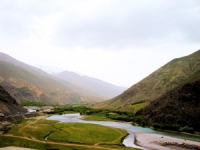Water sharing between Central Asian countries has been conflicting for quite a long time already.
Climate change and international water conflict in Central Asia
This article is a critical assessment of the neo-malthusian claim that climatic changes can be an important source of international tensions, in the extreme even militarized interstate disputes. The most likely scenario is conflict over water allocation in international catchments shared by poorer, less democratic, and politically less stable countries, governed by weak international water management institutions, and exposed to severe climatic changes. The Syr Darya corresponds quite well to all these characteristics. If the neo-malthusian specter of conflict over water is empirically relevant, we should see signs of this in the Syr Darya. The riparian countries of the Aral Sea basin have experienced international disputes over water allocation ever since the USSR collapsed and, with it, existing water management institutions and funding. The worst such dispute concerns the Syr Darya, one of the two largest rivers in Central Asia. Based on hydrological data and other information we find that the only existing international water management institution in the Syr Darya has failed. Based on a coupled climate, land-ice and rainfallrunoff model for the Syr Darya, we then examine whether, in the absence of an effective international water allocation mechanism, climate change is likely to make existing international tensions over water allocation worse. We find that climate change-induced shifts in river runoff, to which the Uzbek part of the Syr Darya catchment is particularly vulnerable, and which could contribute to a deterioration of already strained Kyrgyz–Uzbek relations, are likely to set in only in the medium to long term. This leaves some time for the riparian countries to set up an effective international framework for water allocation and prevention of climate-induced geohazards. By implication, our findings suggest that a climate change-induced militarized interstate dispute over water resources in Central Asia is unlikely.





